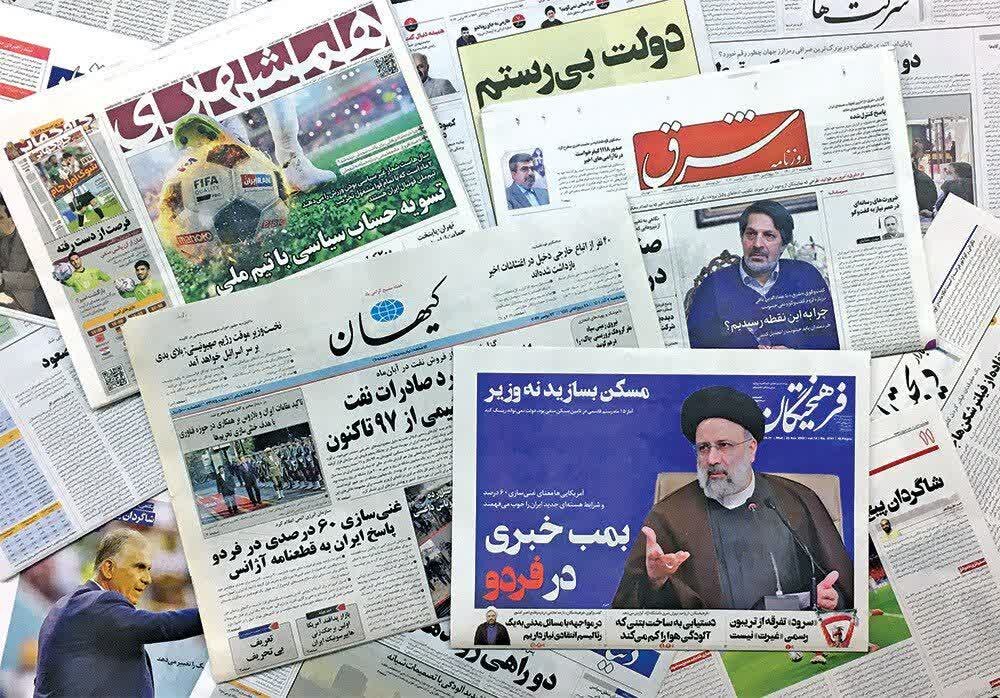Innovative diplomacy in America's backyard

In an in the Iran newspaper, Reza Nazar-Ahari, adviser to the foreign minister, points to Tehran's relations with Latin America and the recent visit by Amir Abdollahian to the region and writes: "The Iranian foreign minister's trip was with a political and economic agenda, and was made to countries that have the most areas for interaction.
These countries see Iran as a country that has continued its way under U.S. sanctions and has not surrendered.
They want to establish all-round ties, whether commercial, scientific, economic, etc.
On the other hand, they consider Iran as a big market for their goods and products.
In the end, the author advises the government to use the 'golden opportunity' that this region has provided to Iran and to support the private sector to take advantage of these opportunities.
Etela’at: Al-Sudani under pressure of political crises in Iraq
From the day that Mohammed Shia' Al-Sudani took office in Iraq, the majority in Iran believed that he supports Tehran, Etela’at wrote.
But after the Persian Gulf Nations Cup was held in Basra with its fake name "The 25th Arabian Gulf Cup" and the Iraqi authorities used a fake name, criticisms started to pour in.
Ever since he came to power, al-Sudani has made serious efforts to maintain close relations between Tehran and Baghdad, but he has two problems: Muqtada Al-Sadr and the United States.
The United States is currently tolerating and assessing Al-Sudani, and the U.S. Treasury is monitoring the use of dollars in Iraq.
Referring to al-Sudani's diplomatic efforts to counter the crisis in the region, the daily writes: The Prime Minister of Iraq is in a critical stage, and that is why the "The Coordination Framework" (the main body backing al-Sudani) supports his policies.
Arman-e Melli: West knows that Iran will not surrender
Writing an article in Arman-e-Melli titled “West knows that Iran will not surrender”, former Iranian ambassador to Lebanon Ahmad Dastmalchian says: In the international arena, the West always deals with political issues of countries with a double standard. It has adopted the same policy against Iran. On the one hand, it threats Iran and on the other, it is trying to show Iran a green light.
In the JCPOA, Iran showed that it wants to cooperate widely with the international community in a win-win situation, but the West did not fulfill its obligations with its hypocritical policy and violated the agreement.
This is while the Islamic Republic has proven that it never compromises its national interests under pressure and is not willing to give concessions or even negotiate under pressure.
If the West agrees to enter into negotiations in such a framework, there is a possibility of an agreement, but if the West wants to talk like a bully again, Iran will not negotiate with the West.
Siasat-e-Rooz: Borrell, a diplomat with double standards
Siasat-e-Rooz writes: Josep Borrell's recent statements show that ambiguities surround his honesty. On the one hand, he talks about reviving the JCPOA and on the other, he lashes out at the critics.
If Borrell really wants to revive the JCPOA, instead of accusing Iran, he should try to change Europe's behavior so that the union will stop playing on America's court and put pressure on Washington to provide answers to Tehran's rightful questions.
Borrell also interferes in Iran's internal affairs, and without providing any documents he accuses Iran of selling missiles and drones to Russia in its war against Ukraine.
If Borrell is really a man of diplomacy, he should pressure Ukraine to provide documents, rather than making the same claims against Tehran during his trip to Kyiv.
Quds: Public diplomacy opportunities and priorities
"Public diplomacy of opportunities and priorities" is the title of a commentary by the Quds daily. The news outlet mentions the recent unrest in Iran and holding of the congress of “Women of Influence” and writes: So far, no event has been as effective as the meeting of Women of Influence in public diplomacy and foreign policy.
The fact is that formal and official diplomacy without public diplomacy is like a bird with one wing.
The media war during the recent months was artificially focused on women and the holding of the conference was very important.
The women's conference was the first of its kind in public diplomacy and related to Iranian women. This is appreciable.
Although it was held very late, the policy must continue so that the world becomes aware of the way women in Iran participate in social affairs. In return, other countries should know that the rights of Iranian women should be respected with their ideological characters and deep history.
Ham-Mihan: Musharraf was against Iran's nuclear program
The most critical time of Iran-Pakistan relations was when Pervez Musharraf was in power in Pakistan, Ham-Mihan writes.
At that time, Pakistan was really a one-man government without any democratic order. Pakistan was a complete dictatorship at that time.
When Musharraf was ruling Pakistan, two presidents were in power in Iran: Mohammad Khatami and Mahmoud Ahmadinejad. He tried hard to persuade Iran to abandon its nuclear program by consulting with Tehran. Also, he repeatedly sent Pakistani officials to meet with Iranians and Americans.
Finally, in February 2007, Musharraf himself traveled to Tehran and in a meeting with Ahmadinejad, Musharraf openly expressed his concern about the confrontation between Iran and the West and called Tehran to prevent it.
Leave a Comment